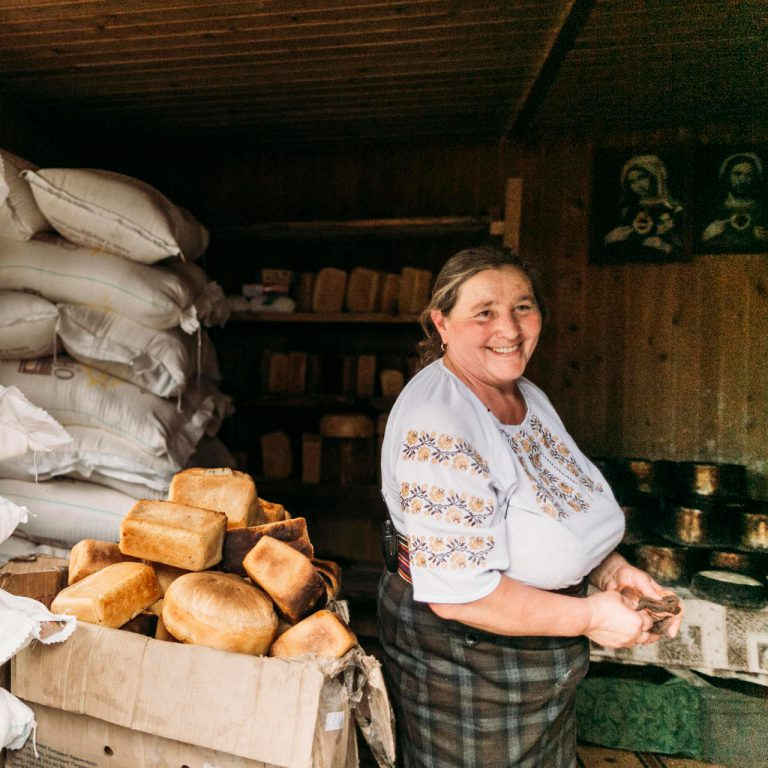The Romanyuks from the Carpathian village Topilche bake traditional Hutsul bread following a special recipe, play several musical instruments, and are masters of unique singing techniques. The voice of Paraska Romanyuk is admired not only in Ukraine but also beyond its borders as well. Together with her husband and son they bake bread each day and sell it to neighboring villages. While baking, they sing. In this way they preserve and reproduce Hutsul traditions and pass their knowledge to others.
Paraska and Vasyl Romanyuk have been together for 45 years. And for almost 20 years they have been baking bread. Paraska Romanyuk inherited the art of creating the traditional Hutsul bread from her grandma and grandpa:
— Our grandma and grandpa were baking bread this way. When my grandpa was 18, he was taken to Germany. For 6 years he was working for some bauer (the German word for peasant) there, and he said that the bread dough soaking period was strictly obeyed. If grandpa did something wrong, the German could come and throw it away. If the bread dough didn’t soak as much as it should have, my grandpa could be given 25 punches for that. God sent grandpa came back here so that the tradition could be born — everyone baked, the whole family of ours.

Earlier, Vasyl Romanyuk worked as a forest ranger, and his family lived in the woods as well. He learned how to bake bread when his wife suddenly got sick. Since then, baking has become a family business.
Paraska and Vasyl’s son, also Vasyl, helps his parents: he harvests and carries wood, stokes the fire, and delivers bread for sale.
The Romanyuks use only the highest quality of flour. They don’t bake dark bread at all. They said people prefer white bread more. In general, the family bakes the following kinds of bread: square, round, buns, kalatches (a kind of fancy loaf ) and Easter cakes. Also, they bake customized bread.

Now the Romanyuks have separate premises with a large stove. When they didn’t have one, they were baking in their small kitchen oven. At that time, they could bake up to 100 loaves.. Now they can bake up to 400.
Paraska says they bake at night:
— To bake bread you must wake up at 1:00 a.m. so that it can soak properly, to ensure it will be tasty. We wake up, brush our teeth, pray to God, and drink coffee to stay awake. We pray to God so that the work goes easy and people like the bread.

— At 8:00 p.m. we go to sleep and wake up at 1:00 a.m., work the dough, and bake. As bread can’t be good if it is done bad. If the mood is not good then the bread won’t be good. We play and sing near the bread — music gives us strength.
The family cannot afford hiring employees because they think that hard work must be paid well and at the moment they don’t have such money:
— You have to pay taxes and retirement fee and buy some flour. When you calculate all the costs no spare money is left. It’s very hard work.

The Romanyuks’ bread, despite the obstacles, regularly goes to Verkhovyna, Burkut, Yavirnyk, and Zelene:
— The roads are terrible; the machines break down. This business is hard to run. There is competition.
During the 2014 Revolution of Dignity, the Hutsul bread even went to Maidan Nezalezhnosti in Kyiv. Their son Vasyl was delivering 150 loaves there per week.
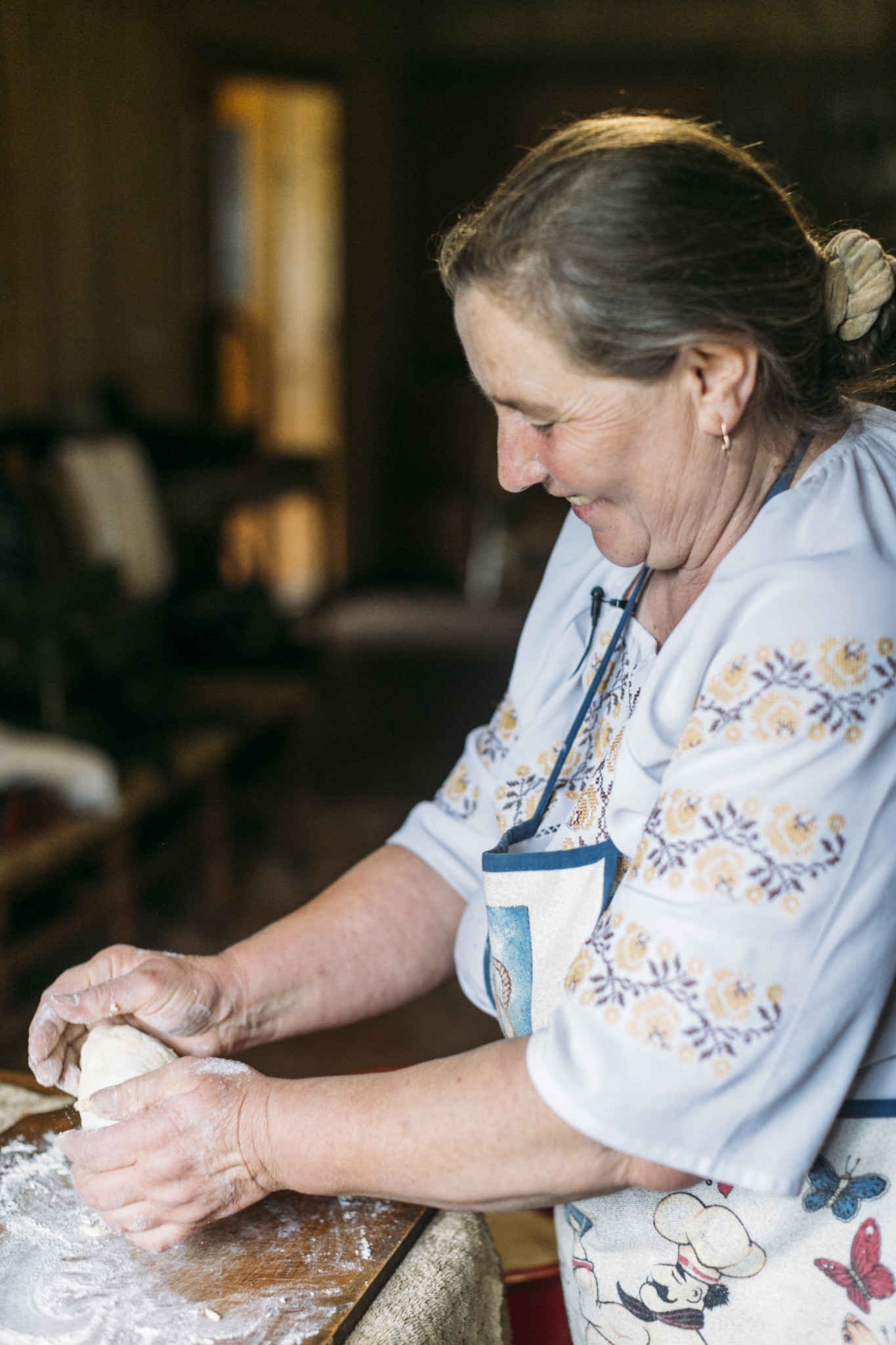
Paraska keeps grandpa’s recipe a secret. The unique taste and smell of the bread her husband explains as follows:
— Nowadays, they add a lot of leavening agent. It helps to better leaven the dough so that you need less flour and still get big bread output. However, that bread is of bad quality, it’s like a sponge — it has no weight and no taste but people eat it. As for us, we use yeast and follow an old recipe. Thus, it has both weight and taste. And since we bake it in a woodfired stove, it also smells great.
Shelf life of the baked bread is around a week but a little shorter in the heat. Vasyl adds that despite slow progress of work they don’t want to automate the baking process. They keep shaping bread manually and baking it in the stove:
— No, this way is better. Such bread has demand. Tourists go for mushrooms to the mountains and take it with them.
The family can’t anymore imagine their life without making bread:
— It’s our life. It’s the thing you won’t live without. The most valuable wealth.
Music and singing
Music and singing play also an important part in the Romanyuks’ life. Paraska started singing when she was a child. The woman remembers that her mother sang well and “egokala”(echo). Egokannya, or kugykannya, used to be very popular in Hutsul songs. Even the singer Ruslana Lyzhychko once came to the Romanyuks to learn this unique Hutsul singing which resembles the sound of a trembita:
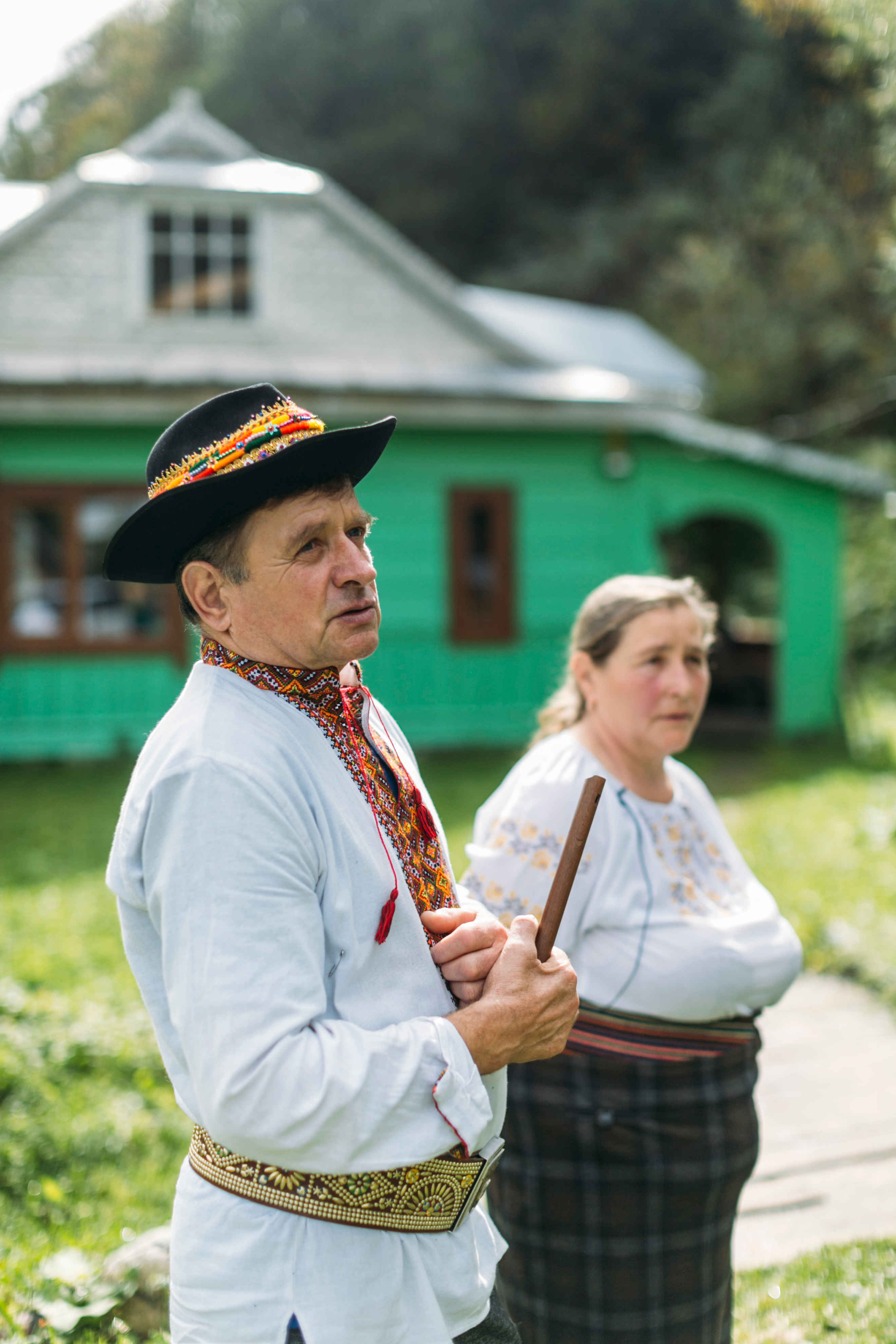
— It (egokannya – ed.) is a kind of our polonyna (valley) echo — people were echoing one to another in case someone was lost. When a youngster from one end of the wood called, a girl could hear where he was. It meant that people could call one to another, from one hill to the other, so that they knew there was someone too, had anyone lost on the polonyna. There could be a fog, you know, or something else.
In Paraska’s family line everyone could sing — both men and women. More eagerly Paraska sang when she and her mother went gazing cows.
— We went for cows, mom egokked, sang, and I studied it. So from. Where I went, I sang there.
Songs have accompanied her during her entire life:
— So it happened that when I got married, to Vasyl, he worked as a forester at the state forestry. And our job was related to the wood. Not a single day passed when we didn’t sing. Unless winter comes, covers everything with snow, and that’s all. And even then, we sing in the house, as the Christmas carolers come.
The Hutsul woman’s unique voice got its fame after the play “Vechornitsi” has been performed in Topilchiy. Vasylyna Yanushevska, a writer and embroider from the neighboring village Zeleniy, V wrote the play At that time, the craftswoman gathered those who could play and sing well.
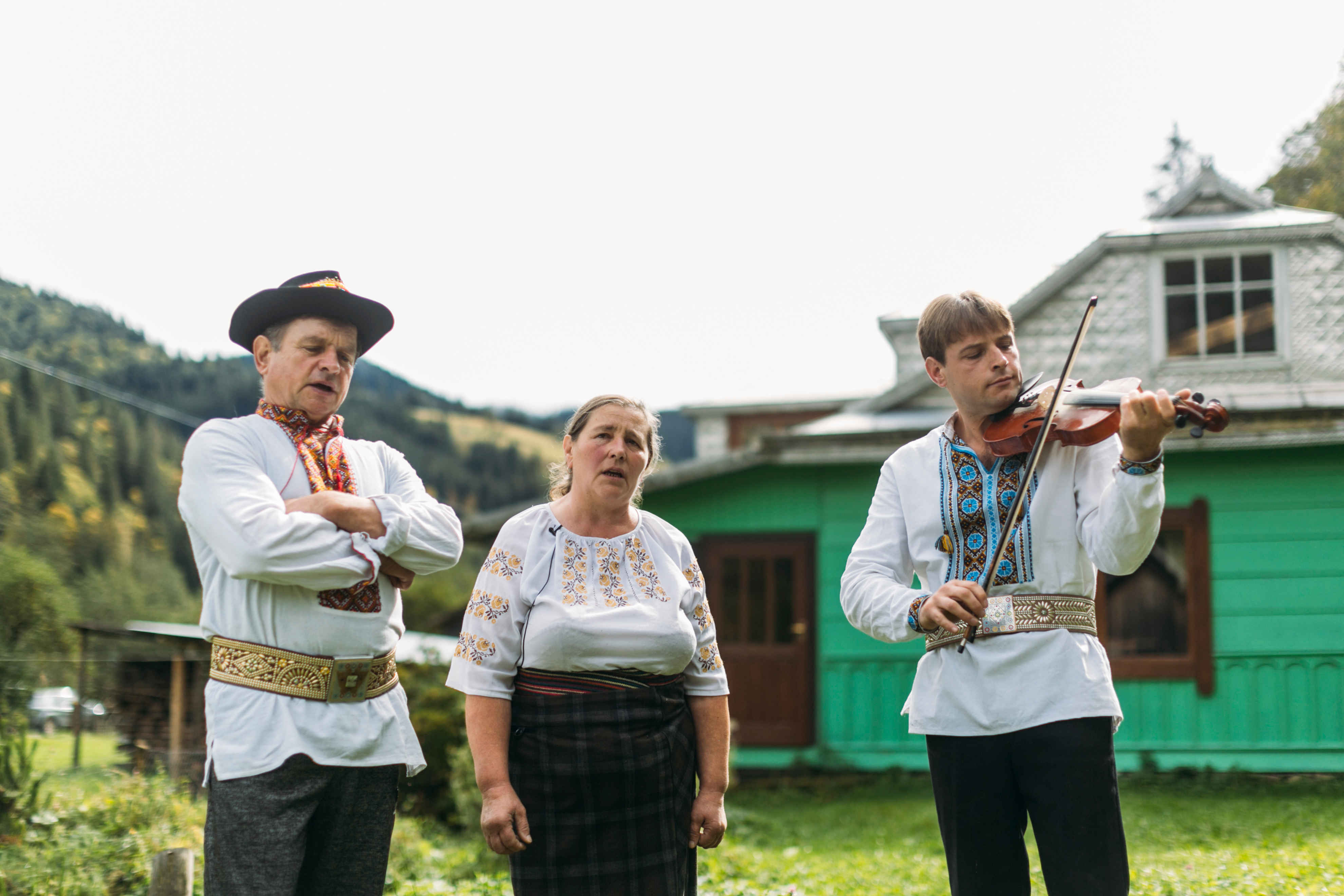
Today, foreigners often come to hear the unique singing of Paraska Romanyuk. The woman eagerly sings for an audience. She also wants to give lessons at school as she thinks that traditions should be preserved:
— I would like to incarnate the authenticity of Hutsul land in children’s hearts. In that way how our grandparents sang. A person who lives in this world wants to leave a mark in history. The way we remember our parents: that they didn’t get drunk, sang and had fun without alcohol. I wish things were the same now, that this devil didn’t seize the world, that at least a part of this green land was left.
Paraska is used to sing while working:
— One doesn’t interrupt another. I do both: make the dough and sing. It can be hard on the soul, because life is life, anything can happen — both good and bad. You hear the song, hear the music, and against all those negative vibes that influence me there is only one delight — the singing.
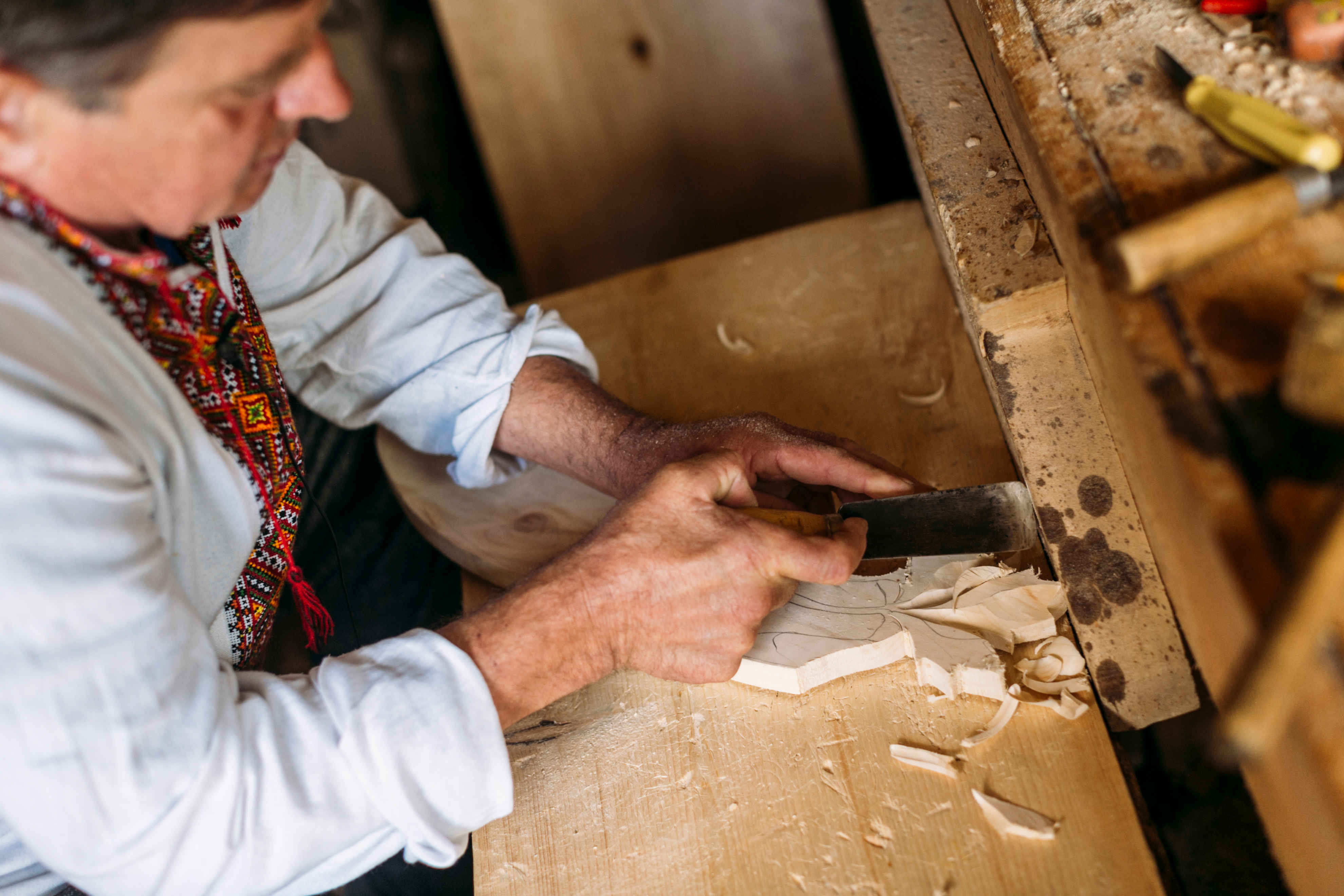
Paraska’s husband has a knack for carving, among other things:
— When I finished school, I bought carving tools and started to make bobbins, the souvenirs popular at the USSR times. Bobbins, owls, kittens, small bears, and other stuff I was making. I used to draw at school; I liked to draw when I was a boy. I do have a talent and a knack for it.
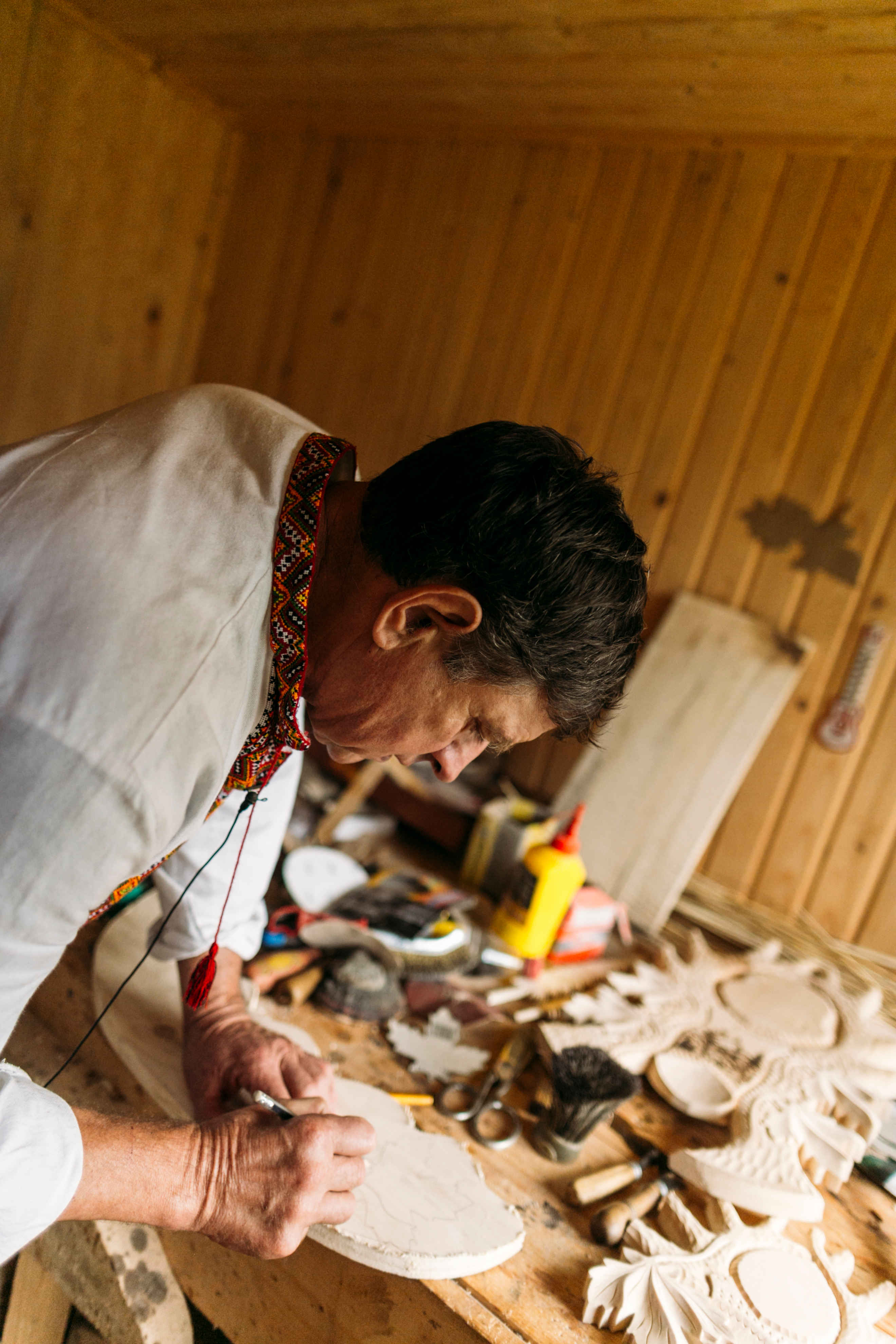
As for music, Vasyl is self-trained — he plays bayan (a type of accordion) and dudka (a woodwind instrument). Although now, to tell the truth, he devotes not much time to playing instruments because a few years ago he injured his arm.
He spends more time at his workshop where he makes stands for antlers, pictures and frames, mainly from sycamore, cedar, and aspen.
Especially popular are stands for antlers. By the way, for their production the deer themselves are not get killed — in spring the deer shed their antlers, which later are found in the woods by the artists:
— There is a trend here in Hutsulshchina. People like to hang these trophies on the walls. Our great grandparents did, then people understood they could do something else too. Now they make bowls, jewelry boxes, and dishes for brynza.
His son Vasyl has been learning to play musical instruments since his childhood — first his father’s bayan and later a violin. One of Vasyl’s teachers is a famous Hutsul virtuoso musician, Roman Kumlyk:
— Twenty lessons I took from Kumlyk, but at that moment I could already play. I trained a bit with him, and later on he gave me a tape-recorder as a present so I continued my training following the tapes. I’ve learnt a lot out of it.
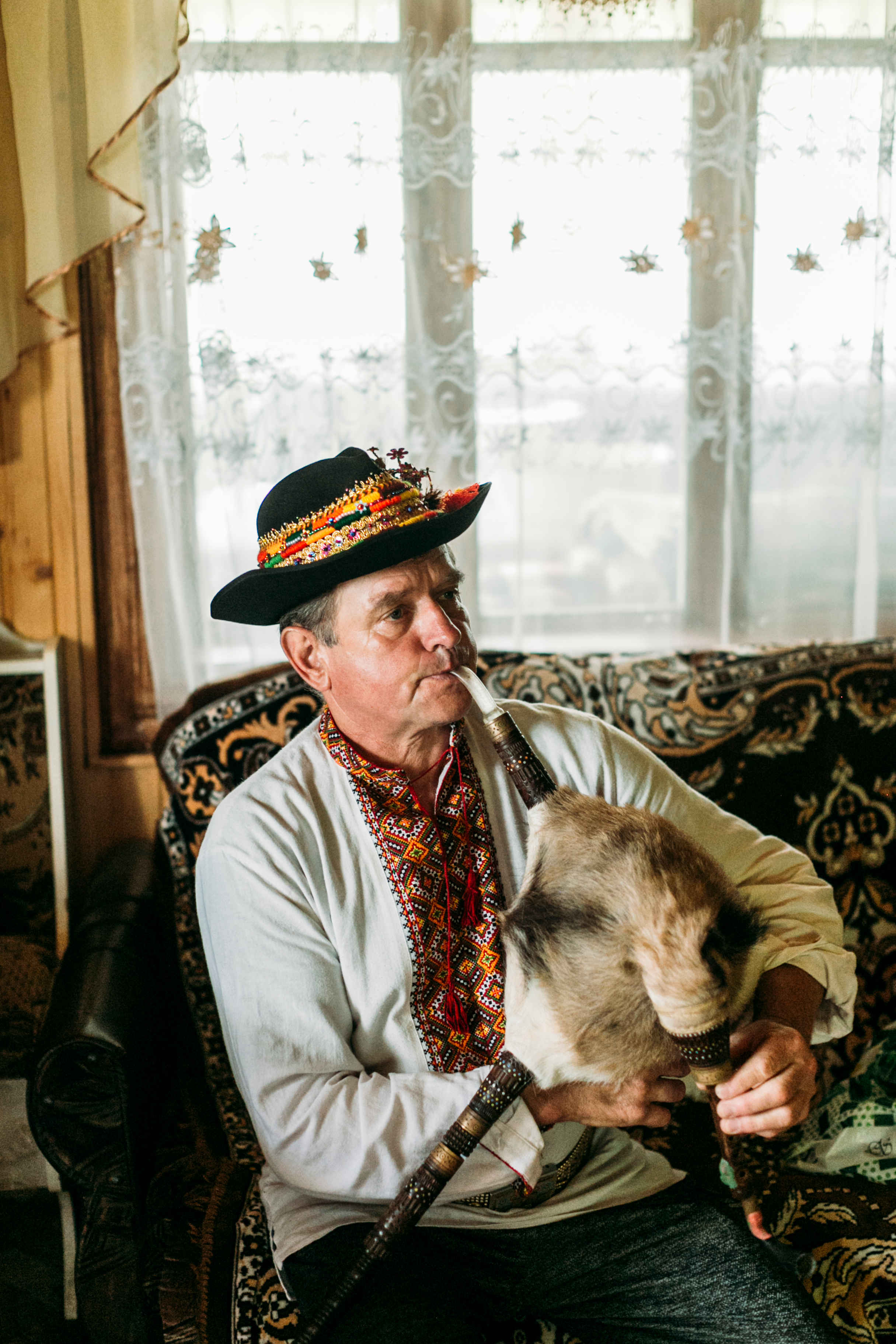
Although he understands that music can bring him money, Vasyl isn’t in a rush to devote all his life to it because for him it is more like hobby.
— I don’t think much about building some career — all that is secondary to me. The family of Sablis, in my mother’s line — they were strong singers.
What’s important for Vasyl is the genuine Hutsul music:
— Sometimes it happens that, when people sing, you hear the diversity of sounds. There are people who don’t want to hear that, so they say it’s all the same. But it is not — there are many tones. You should see the difference — then you know at once when someone sings well and someone does not. Even when you yourself don’t play well, in singing you hear how it should be. And sometimes, in singing, there is no more former flavor or former authenticity in music. You start playing after a person, but it’s all not that.
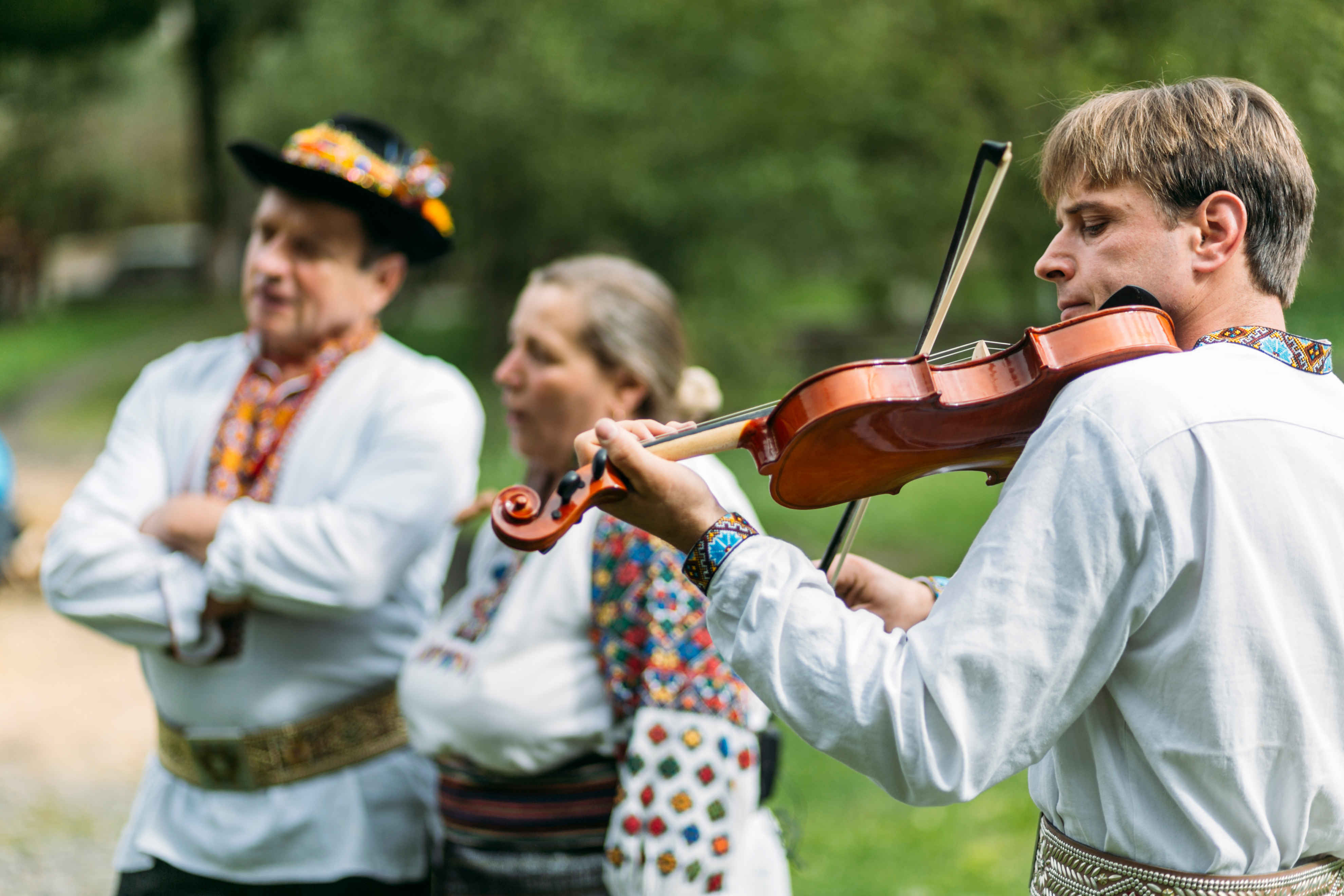
Hutsul music instruments
It’s not a secret that Hutsul musical instruments have always been a special vital attribute for them.
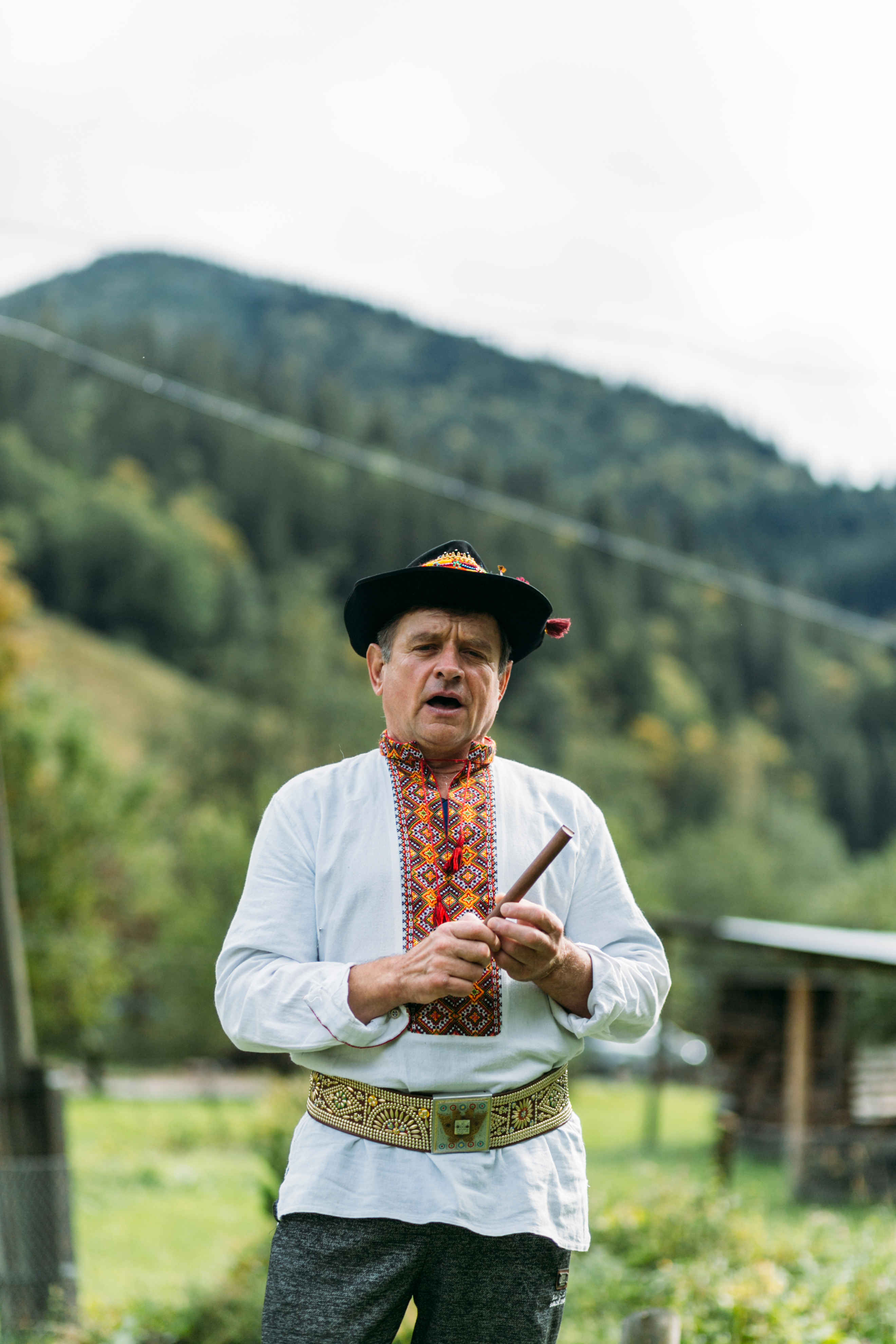
Hutsul music instruments that are considered traditional are the drymba, trembita, sopilka, floyara, duda, rih, small bell, telenka, ocarina, dentsivka, popyskalo, derkach, lira, violin, tsymbaly, tambourine, and berbenytsya.
The most famous Hutsul instrument is trembita which was also somewhat of an alarm clock and the way shepherds communicated.
Unfortunately, not all instruments are actively used nowadays:
— We have a skripa (violin) remaining, left as it was. Floyara, sopilka as well, and tsymbaly. These are the most traditional we have, a folk instrument group of three musicians used to play them. And surely tambourine, but mostly floyara was played. Because a lot of different instruments were invented — all those saxophones, clarinets, and accordions as well. But otherwise, the very native are our sopilka, violin, dudka — a hornpipe of goat. It is a very old and ancient instrument.
Traditions
Many tourists come to the Carpathians for Hutsul flavor. Here you can still see how “knyagynya” (a bride) is dressed up, to hear old wedding songs, how trembita sounds on the polonynas, to see the authentic Hutsul clothes, and to taste their traditional dishes.
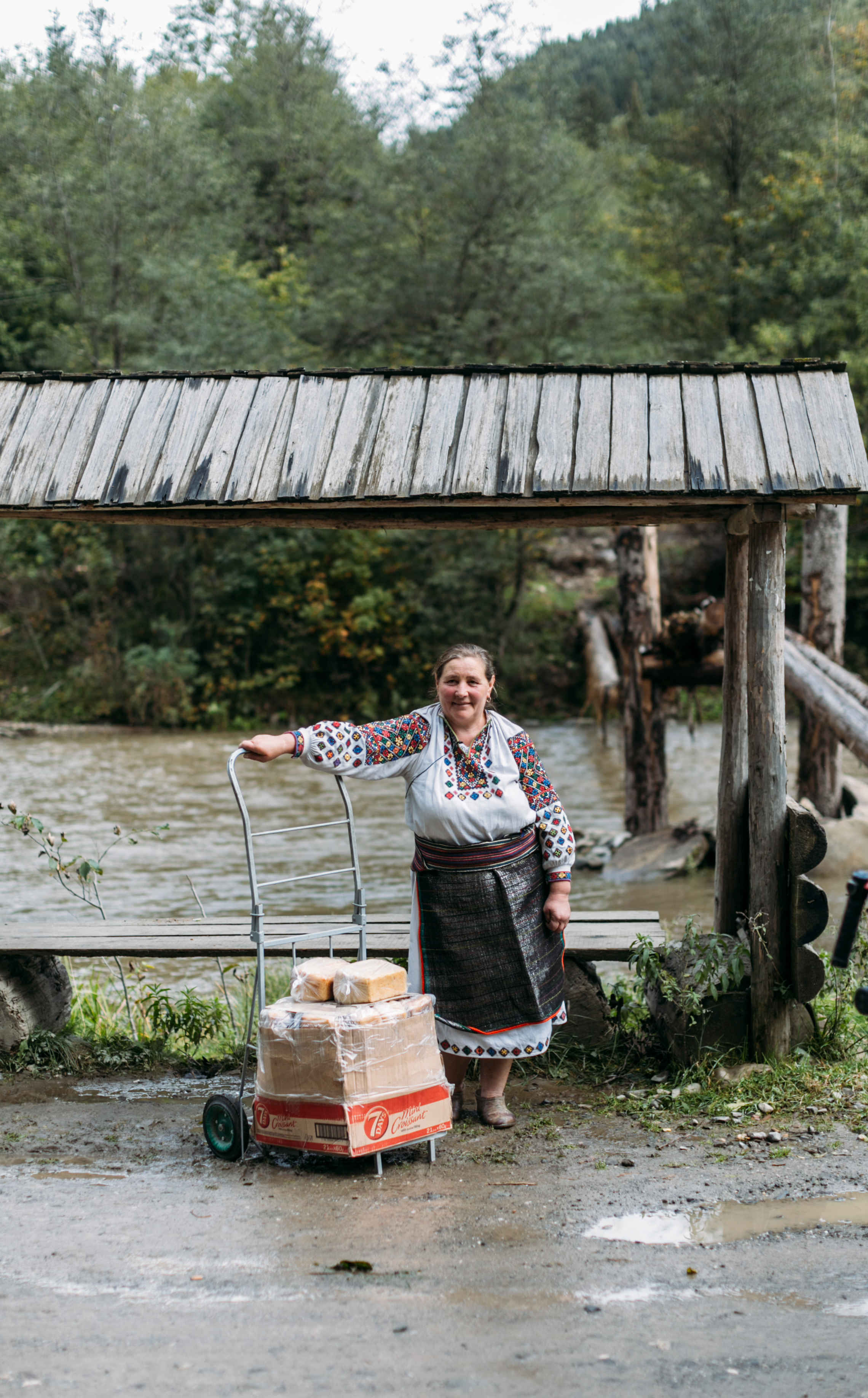
For Paraska Romanyuk it is necessary to preserve and pass on the Hutsul traditions:
— It seems to me that if we don’t try to preserve the authenticity of Hutsul land — singing, dancing, the clothes as they are on Hutsulshchina, traditions and customs — if all this is gone, we may consider that our nation is gone, that Hutsuls are gone, that they are lost.
The son Vasyl also says that you should differentiate between people who preserve the traditions and people who live the traditions:
— Few live the traditions. The ones of the older generation — they live and think this way. Because Hutsuls are primarily a pagans. And tradition, as Ivan Ogienko wrote, is a syncretism — a dual belief. It turned out that ancient pagan beliefs overlapped the new Christian ones, and this way emerged such Hutsul custom and such Hutsul tradition where there is a great deal of ancient beliefs. Those beliefs are truly preserved by people only subconsciously, but there are very few of those left. In general, everything that happens at the level of culture is kind of a folklore, it’s a reproduction — it’s not living by them, it’s something a bit different.
Paraska and Vasyl no longer have the typical Hutsul vechornytsya (a party) and know about them only from stories of their grandmothers. Paraska says her grandma wanted her to value everything traditional and was angry about the “outsider’s music”. Now, the woman recollects the stories about vechornytsyas and communal work:
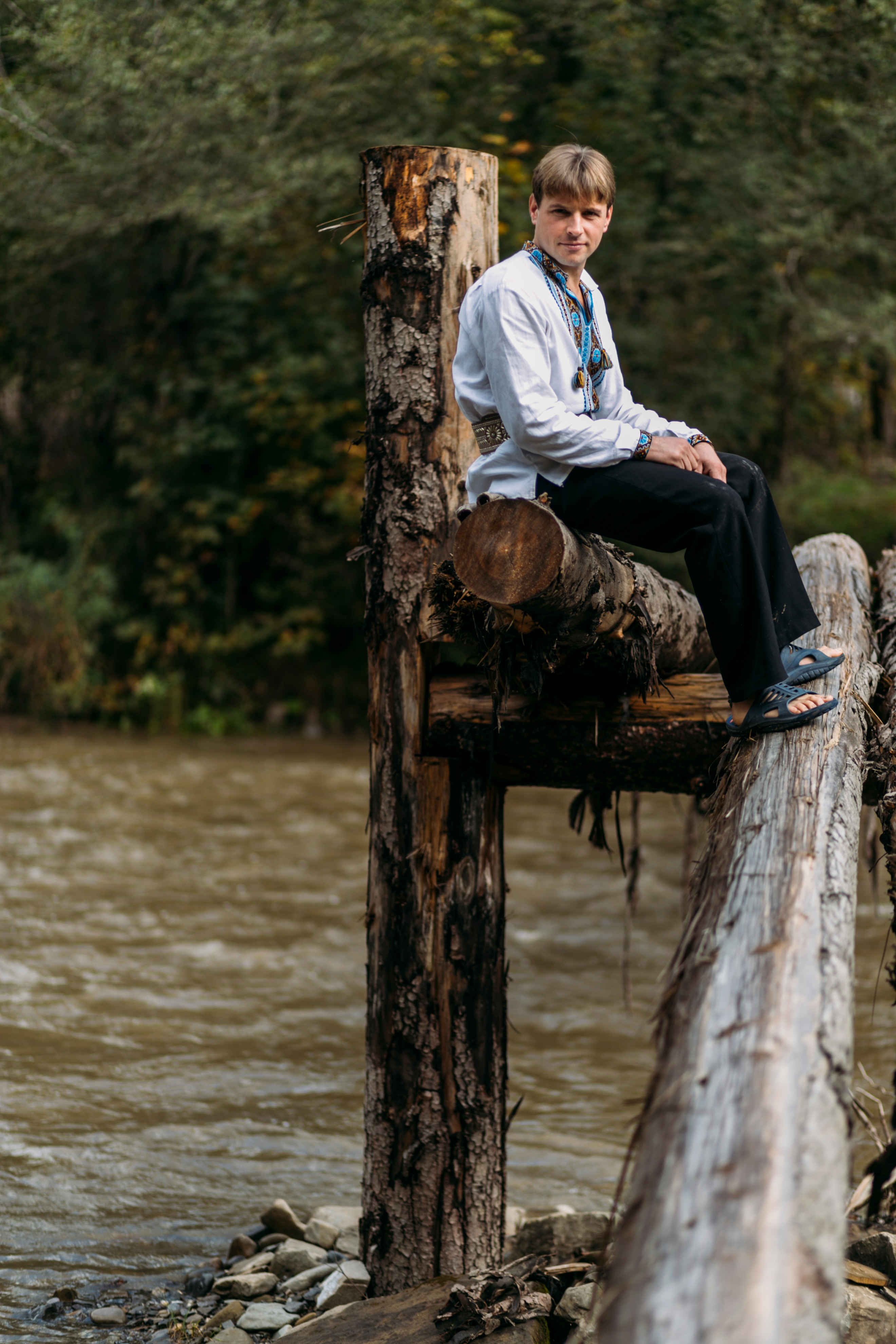
— Earlier, the houses stood not so close to one another as they are now. At that time, the space between houses was rather large. So people either egokaly (echoed) or played trembita, and this way they gathered in the evenings. They either carried woods, or spun, or sewed. It was called communal work. Some spun, others embroidered in the evening. Some baked burishniky, others — bread. And this way they played either violin, or floyara, as there were no musicians at first. Floyara and violin. Sang and had parties. As for vodka, no one heard of it. As no one drank it. My grandma told me that at communal work no one ever gave vodka. And for Christmas carols, when people gathered to go caroling, and there were about twenty men of them, there were about two hundred fifty grams of vodka, just two hundred fifty grams for Christmas which were enough for all three holiday days. A tiny portion it was. So tiny that it was just two to three drops of vodka per man.
During the latest 20 to 30 years, the culture, life, and visual appearance of Hutsuls changed a lot. Vasyl tells us about it:
— Technically, in the olden days there were no such garments — they were a little simpler. There could be nothing to eat because people lived poorly. They cooked golubtsi (stuffed cabbage rolls), jellied meat, and banosh. Keeping horses was prohibited except for on the collective farms. There was no such fun, no such luxury as nowadays. Now they make large dining rooms, areas, and formerly the parties were held in the house. After war there were fewer people, it took many of them. And now people have built better homes, while in older days there were small ones. Now each has a car and people live better. The retirement fee is not enough, but life is livable — you have to work though.
Paraska’s relatives live abroad, and they offered her to move there too. But the Romanyuks don’t want to move anywhere:
— No, I would never leave my mountains! Unless, save Lord, someone removes my body.
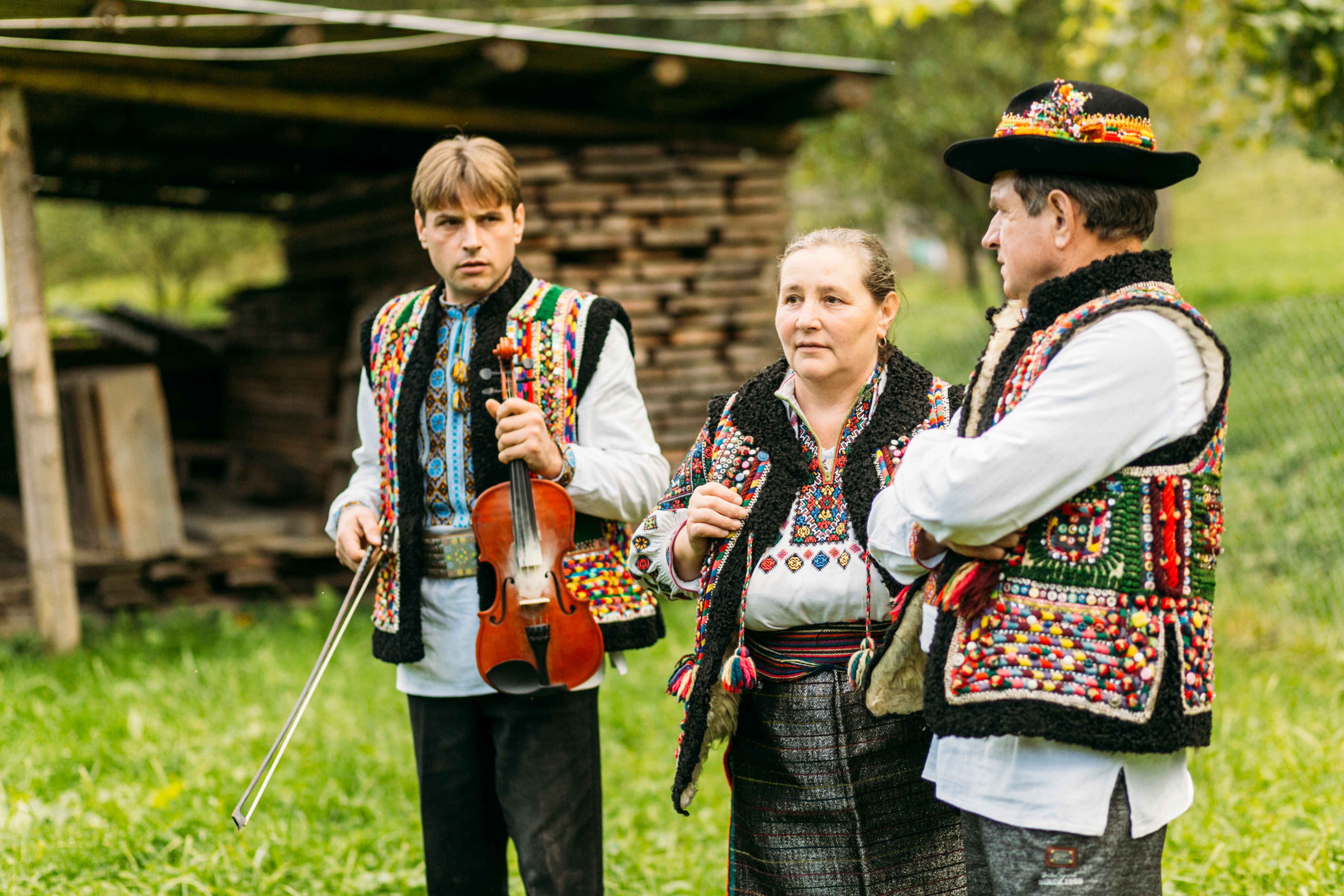
The question, why Hutsuls preserve traditions so well, the Romanyuks answer in short:
— The thing is that everything took roots into every soul. Who loves it, who respects, it keeps it safe.
How we shoot
Watch our new vlog to learn more about our visit to the Romanyuks family in Topilche, as well as about the mushroom that talks and a picturesque Hutsul wedding in Verkhovyna.

